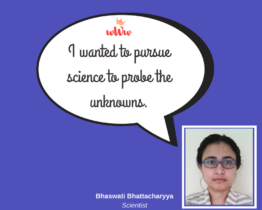BHASWATI BHATTACHARYYA, SCIENTIST

After completing my B.Sc. Hons. (Physics) from New Alipur College, University of Calcutta, and my Masters (Physics) from the University of Calcutta, I joined the Joint Astronomy Programme (JAP) run by the Indian Institute of Science, Bangalore, to pursue my Ph.D. in 2002.
In 2009, I pursued my doctoral research on observational studies of radio pulsars. After training as a Marie Curie fellow in University of Manchester, UK, I joined NCRA as Reader to continue my research on pulsars.
Pulsars are the most accurate celestial clocks. They aren’t really stars – or at least they aren’t “living” stars. Pulsars belong to a family of objects called neutron stars that form when a star more massive than the sun runs out of fuel in and collapses. This stellar death typically creates a massive explosion called a supernova. Neutron stars are generated in supernovae explosion. Neutron stars (ultra-compact objects formed after the supernova explosion of a star more massive than sun) are accessible to observations as pulsars.
Pulsars are rapidly rotating with speed even faster than your kitchen blender. With telescopes we detect about one 700 pulses per second from fastest the pulsars. They are very compact objects and one sugar-cube sized bit of material from pulsars will weigh as much as the Mount Everest!
Pulsars are strongly magnetised neutron stars (100 billion times Earth’s magnetic field) that can be used as extremely precise celestial clocks) and thus provide a valuable means for probing the most extreme states of matter. About 2600 pulsars are known till date, which is about 1% of total prediction. My key role is to conduct searches for new pulsars and I have discovered 22 new pulsars with exotic properties.
Witnessing an increasing number of women in science, especially physics and experiencing a positive and encouraging environment for women in research is something I find extremely happy to note. As a mother to a 6 year old son, I would like to emphasise on the importance of time management and I believe that being keen, motivated and optimistic towards goals will fetch opportunities, and hard work will bring success.
Bhaswati Bhattacharyya is a scientist in the National Centre for Radio Astrophysics.
Disclaimer: The views and opinions expressed in this article are those of the author and do not necessarily reflect the views of The Wonder Women World.
